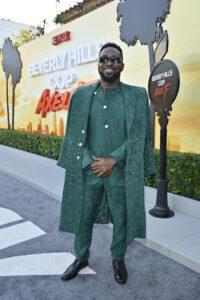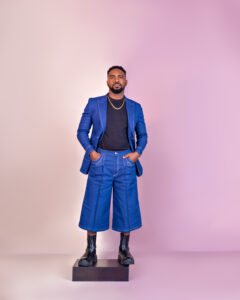
In this edition of “Meet the Star,” a segment dedicated to spotlighting talents in Nollywood, Uzor Arukwe talks about his career journey, his Hollywood premiere experience and his role in the recent film “What About Us?”
In our previous feature, we caught up with Folu Storms, who talked to us about her lawyer-to-media star journey, her signature Afrocentric style and her role in the upcoming Nora Awolowo‘s upcoming movie “Red Circle.” If you missed it, you can read it here.
From “Tonnie Fishbrain,” a film he did out of pure passion without receiving a dime, to starring in the highest grossing Nollywood movie “A Tribe Called Judah,” Uzor Arukwe has proven his versatility and resilience. Overcoming the typical challenges faced by those breaking into Nollywood without an easy path, Uzor has not only earned his place in the Nigerian film industry but also established himself as a force to be reckoned with. His journey has been marked by continuous growth and evolution, with no signs of slowing down.
The economist-turned-actor recently returned from Los Angeles, where he attended the premiere of “Beverly Hills Cop: Axel Foley.” In our conversation, Uzor shares the beginnings of his acting journey, the challenges he has faced, and the pivotal movie that changed his career trajectory. He also gives us a glimpse into his Hollywood premiere experience, including the thrill of being in the same space as Eddie Murphy, and hints at the possibility of seeing him in a Hollywood film in the near future.
***
Speaking of your career changes, the switch from a corporate job to acting couldn’t have been easy. What finally pushed you to take the plunge and fully commit to acting in 2018?
The major reason would be that God made me very uneasy. It wasn’t easy. I had worked for almost 10 years in corporate and still did not find fulfilment or satisfaction. I was climbing the ladder in the business, but I wasn’t fulfiled. Coupled with my boss not being the easiest person to work with, I decided it was time to jump into that scary, uncomfortable zone of my life. I took the leap of faith, and God has been faithful since then.
Did you ever have moments where you questioned your decision and considered going back to a nine-to-five?
Of course, several times. After I left in April 2018, I had a fatal accident in May 2018. I didn’t get a job until August 2018 when Onyinye Udezeh called me to do a film for Iroko. During that period, I was fixing the cars I damaged in the accident, and it was very trying. I was really broke. In August 2018, Onyinye called, and my life gradually started taking a turn. I’m grateful to God for that. I got a job with Keystone Bank, did my medicals, got my offer letter, but decided to focus on my creative skills. Thank God, here I am.
We know your mum championed your acting dreams, but your dad might still be warming up to the idea. How did you navigate these family dynamics and chase your passion?
It’s still difficult because my father hasn’t fully come around. My mom knew this was my calling but was slow to coming around. When she did, she supported and prayed for me, igniting the fire inside me. My father still hasn’t accepted that his son is an actor. It’s a delicate, slippery slope. I’m careful with how I talk and handle myself around him. He’s old now and not as reactive. He’s been hearing about my job, but it’s not easy to navigate. I’m still finding my feet, letting everyone understand that it’s a full-time job, not a hobby. This is what God has called me to do, and I’m glad to be doing it.
The movie “Sugar Rush” seems to have been a game-changer for you. Tell us about the experience and how it impacted your career.
Looking back at your journey, from “Tonnie Fishbrain” to “Sugar Rush” to “The Tribe Called Judah” and now “What About Us?”, what has changed the most for you in terms of your approach to acting and the roles you take on?
Let me tell you a fun fact about “Tonnie FishBrain.” It was one of my first films ever, which I did while still in university as part of the Christ Embassy Project. It was a laboUr of love, and I didn’t get paid a dime for it. We shot the film in Ozark Valley in Abia State, and it took almost a month under some of the most challenging conditions. The great, blessed memory, Reginald Ebere, directed the film, which was some sort of musical. It was very tough, but I didn’t mind because I was passionate about it. I didn’t receive any payment for the film, perhaps because I attended Christ Embassy at the time, and they considered it ministry work.
One thing I’ve learned about the arts is that you learn something new every day. Art isn’t like science, where one plus one always equals two. Art is dynamic and constantly evolving. You can never truly graduate from the School of Arts because there’s always more to learn. You strive to be more organic, get comfortable in your own skin, and understand a wider range of emotions and reactions. Since “Tonnie Fishbrain,” I’ve received more training, both direct and indirect, including masterclasses. I have mentors now, like John Ndjama and Stella Damasus, who have influenced my acting techniques. I understand various acting techniques and choose which one to use for particular films, scripts, or sets.
Speaking of “What About Us?”, tell us about your experience working on the project. Did you have any favourite scenes or moments?
I did. First of all, it’s a faith-based project, but what I like most about it, or even why I like it so much, is that, as much as it’s faith-based, it’s not screaming “Christian, Christian movie” in your face. It’s not saying, “Oh, I’m a Christian movie.” No, it’s a film that’s relatable because it’s about things that happen in our day-to-day lives. As an actor, we look forward to those scenes where you’re given the freedom to navigate different emotions—from smiling to anger to sadness. There were a lot of moments like that, a funny and emotional rollercoaster, in “What’s About Us.”
Given the increasing popularity of streaming platforms and YouTube for film distribution, are you considering producing films for YouTube? If so, what can we expect from your future projects?
What Nigerian song is currently on repeat on your playlist?
When you are not gracing the set, what would we find Uzo Arukwe typically doing?
If you had the opportunity to get the government’s attention to grant your wish towards the growth of Nollywood, what would you wish for?
Imagine you flip a coin: heads, you get 100 million naira; tails, zero naira. If you don’t flip at all, you get five million naira guaranteed. Would you take the chance or go with the guaranteed five million?
I will flip the freaking coin. I will flip the coin. I believe in favour, grace and goodwill. I will flip the coin. Five million is a lot of money, but I believe that if I can earn one hundred million, why not go for a hundred million as opposed to settling for five million? To be honest, life has taught me that it’s risky not to take a risk. You know, I feel like there’s a lot more on the other side of fear. So, I would flip the coin. Yep!
Thank you BellaNaija. I see the great work that you guys are doing. Keep doing it. I’m such a big fan. Thank you for having me.
The post #BNMeetTheStar: Uzor Arukwe on His Switch from Corporate to Nollywood, Future Projects & More appeared first on BellaNaija – Showcasing Africa to the world. Read today!.






